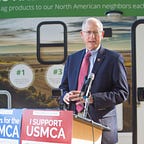CARES Act Delivers for Rural Communities in Need
At few points in our nation’s history have we been faced with a situation as dire as the one before us today. This threat is unusual and unfamiliar, but it is as real as every other great crisis we’ve faced.
This pandemic is upending the lives of every American. Some have died or lost loved ones. More have become ill and hospitalized. Many have lost their jobs or shuttered their businesses. All of us are agonizing over the uncertainty of a threat we do not fully understand.
This public health crisis has put Americans on edge and has led to unexpected economic crises for tens of millions of Americans, as businesses are forced to close, paychecks are disappearing, and economic activity is reduced.
The size and scope of this aid package is staggering, but it reflects the devastating costs in lives, jobs, businesses, and economic paralysis that this crisis has brought. It is essential that we continue to act quickly and forcefully, at all levels of government, to prevent the harm and disruption of this crisis from overwhelming our capacity to help one another. The CARES Act provides the foundation for that action.
The CARES Act will help Americans meet these intertwined emergencies by providing funds to hospitals and frontline medical providers, expanding and accelerating assistance for Americans who have lost their jobs, and providing a lifeline to businesses trying to stay afloat and pay their employees while their customers are asked to remain at home.
My colleagues have shared the details of this package and how it connects with families, employees, and Main Street Businesses.
But rural America faces unique challenges that we worked to address in provisions across this legislation.
While we see the clear and overwhelming costs that this health crisis is imposing in places like Seattle, New York, and New Orleans, it is imposing heavy cost in rural communities as well. Our health care challenges are magnified by a lack of resources, technology, and specialists, and compounded by extended distances and an older population. Rural hospital systems, already strained to the breaking point, will face unbearable pressures as more cases of COVID-19 appear in rural communities.
That is why the CARES Act makes over $100 billion available to our nation’s healthcare providers, including hospitals and community health centers in rural communities, to ensure that they have the resources and the financial strength to continue to serve every American during this crisis.
In addition, the legislation increases payments to rural hospitals and health care providers, to offset the additional costs of providing services in rural communities. Finally, it provides over $200 million to the Departments of Agriculture and Health and Human Services to develop and implement telehealth and telemedicine services in rural communities.
But, as we are all painfully aware, this crisis is not just a health crisis and the economic crisis created by this pandemic is hitting farm country, which was already suffering long before this virus emerged. Agricultural producers are particularly sensitive to disruptions in trade, supply chains, transportation, and reliable sources labor, each of which are under increasing strain.
That is why we fought hard to include significant funding to support the rural economy during these turbulent times. The CARES Act includes $23.5 billion dollars to permit the Secretary to continue to make good on the farm safety net while meeting the new challenges posed by this crisis. These funds will be used specifically to protect our farmers and ranchers, including our cattle and dairymen, and specialty crop producers.
In addition, the CARES Act provides $350 billion funds through the Small Business Administration’s Paycheck Protection Program to small businesses of all types, including agricultural producers and rural businesses, to weather the disruptions in economic activity. The Paycheck Protection Program is an important new authority that will provide rural small businesses with rapid access to cash, through loans and grants, to keep paying workers and maintain their businesses while they wait for the economy to recover.
Finally, the CARES Act provides the funds for an additional $1 billion through the existing Business and Industry guaranteed loan program, which helps rural lenders extend new credit to rural businesses.
I continue to believe that the needs of rural America may outstrip the resources provided in this package as agricultural producers and rural communities grapple with the crisis as it inevitably moves into less populated communities.
The funding provided though the CARES Act is significant and will be felt across the heartland. As this pandemic unfolds over the coming weeks and months, we will keep fighting to ensure that sufficient resources are available to farmers, ranchers and rural America.
Despite the circumstances we presently find ourselves in as a nation, I have unbounded hope for our future. In my own lifetime, I have seen our nation rise to meet challenges that seemed insurmountable at the time. Looking back further in history, we see burdens that our ancestors bore that seem unfathomable to us today. Overcoming adversity is in our DNA.
Our capacity as Americans to care for one another is immeasurable. Across our country, families, neighbors, churches, businesses, civic clubs, and groups of Americans of all stripes are quietly coming together to figure out what they can do to help.
Our farmers and ranchers, and everyone involved in producing, transporting, and selling food, fiber, and fuel, are no exception. These men and women are working overtime because they understand the way they can best serve their fellow Americans is to prevent disruptions to the food and goods that we all need to survive.
We are a country of survivors, and I have great confidence in our ability to re-emerge from this crisis stronger than ever before. I believe that they CARES Act will help us do that.
